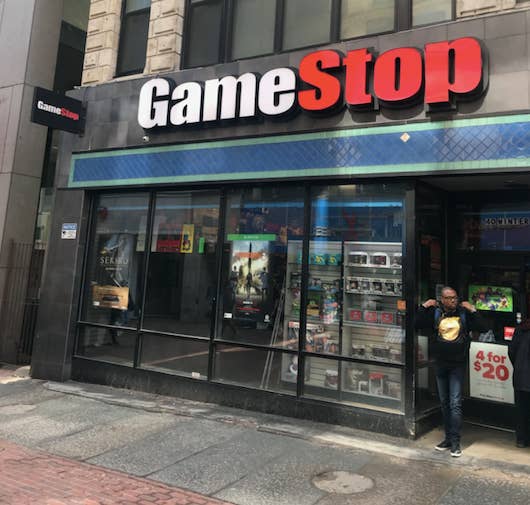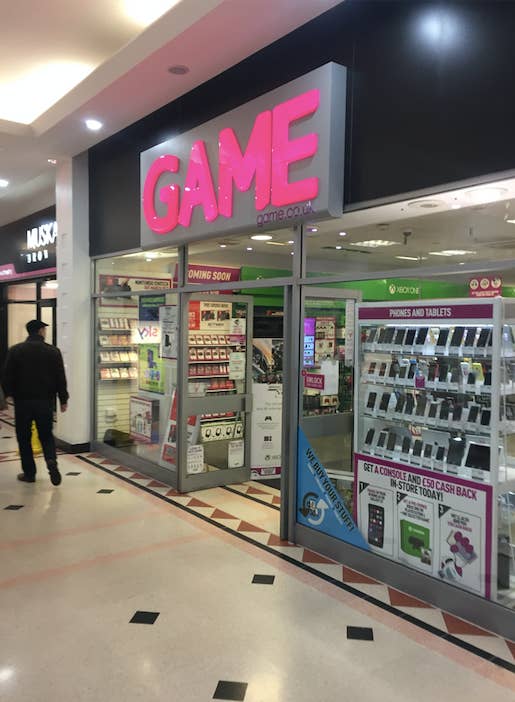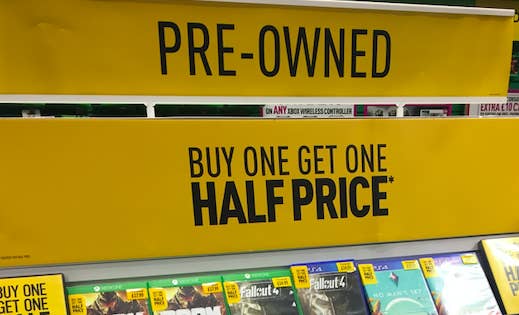Is it all over for pre-owned video games?
Second-hand game sales remain significant, but the recent decline is by no means temporary
The pre-owned games market has been rapidly declining over the past three years.
To be clear, people are still buying second-hand games. Retro games, eBay, even your local car-boot sale; there's a community of active consumers picking up classic titles that have been previously owned. What we're talking about is the trade-in economy. Professional retail chains like GAME, CEX and GameStop, which will take your games and give you credit against the next one.
It's the practice that one former publishing boss described to me as the, "great evil in video games." Even former EA executive Peter Moore acknowledged that legacy sales of games were almost non-existent because of the trade-in market.
One of my first big stories when working for the British trade publication MCV was on Asda (the Walmart-owned UK supermarket) moving into pre-owned. The head of Asda's games department hadn't meant to tell me, because he had yet to discuss it with the company's partners, including games publishers. The reaction was so angry, I had a distraught Asda PR representative begging for me to clarify that the company wasn't going to sell second-hand games -- six months later, that's exactly what it did.
"One former publishing boss described pre-owned to me as the, 'great evil in video games'"
The hatred publishers have shown toward the pre-owned market centred on the fact that retailers were no-longer purchasing older (legacy) stock from distributors, and were instead buying it from consumers and selling it on. Developers and publishers weren't seeing a single penny from those sales. If you want a reason why publishers became wary of short, single-player experiences, this is one of the most important.
But not everyone hated it. Indeed, some smaller publishers acknowledged it as a necessary evil. With consumers unwilling to pay full price for boxed games, retailers had to sell products for below recommended retail price to compete (and still do). Pre-owned was a means for specialists to still bring in a healthy profit.
And then there was the argument from the retailers, which was that second-hand trading increased sales of new games. Consumers would effectively buy a game, play it until completion, and then trade it in against the next one. It was effectively a glorified rental system, and there was certainly a community of gamers who did this frequently (and still do).

Now, however, pre-owned is in sharp decline. In the UK, Kantar reports that pre-owned software was worth £123 million in 2015. That dropped by 3.3% in 2016, then a further 15% in 2017, and more than 30% in 2018. According to Kantar, sales of pre-owned games are now worth £67.9 million. The data firm told GamesIndustry.biz that the proportion of pre-owned video games is 20.6% of total physical games sold over the past 52 weeks, compared to 27.2% last year (UK market only).
In its last financial report, the UK retailer GAME reported that pre-owned (including hardware) dropped 20.9% over the prior year.
And it's not just in the UK. In the US, second-hand sales are also dropping, albeit at a slightly slower pace. In 2017, GameStop's pre-owned sales fell by 4.6%. And for it's latest financial year, pre-owned sales are down 13.2%. That decline has been accelerating, with pre-owned falling 21.3% during its fourth quarter. The firm states that this is driven by pre-owned software falling, as pre-owned hardware actually increased year-on-year.
What is causing the decline?
It's all structural. Fewer gamers are trading-in products, and therefore there are fewer second-hand games and consoles that are available to sell. This is partially linked to the decline in physical sales, and the shift towards digital -- a trend GameStop also cited in its latest financial report -- but also the rising popularity of games-as-a-service. Consumers are simply playing games for longer, with fewer reasons to trade them in.
"We are being really clear with the market and shareholders that this is a structural decline"
Martyn Gibbs, GAME
But there's another big reason, and one that GameStop's Shane Kim places front and centre.
"It does have to do with how customers can get some of those older titles, the very inexpensive titles that you can get through either subscription memberships or online in a pretty heavily discounted mode," Kim observed in the firm's latest financial call.
Indeed, aggressive digital sales means that consumers are increasingly buying legacy titles as downloads, as opposed to second-hand games in stores. This is forcing retailers to target other business areas for growth, reducing their activity in the used games space.
Can it be turned around?
Interestingly, the word from retail is no -- at least, not in the long-term, though the arrival of new consoles in 2020 might cause a temporary uplift.
"There are things that we can do, and we are doing, in terms of better promoting our trade-in offers," GAME CEO Martyn Gibbs told us. "But this is a structural decline, and management isn't going to put its head in the sand and pretend this isn't going to continue.

"Obviously, if new consoles come to market, we will see trade-in and pre-owned become a materially important part of the market again. There are things we can do, and we are doing, to soften that decline. But we are being really clear with the market and shareholders that this is a structural decline. If you have less people trading in games, you have less stock to sell, and those numbers will decrease."
Plus, with the rise in subscription services (like Xbox Game Pass) and the launch of new streaming platforms (like Google Stadia), pre-owned is likely to decline further in the months and years to come.
Is it hurting new game sales?
This is obviously difficult to judge, but it seems unlikely. Instead, pre-owned's decline is indicative of the fact that gamers are playing titles for longer, increasingly buying digitally, and purchasing fewer products generally. New game sales are being hurt by the same phenomenon, but that's not explicitly to do with pre-owned.
Pre-owned is also still a high margin business, and there's certainly a market for it. In the UK, there are still 1.8 million pre-owned customers (Kantar data), and in the US it's worth in excess of $1.86 billion for one retailer alone (GameStop financials).
Nevertheless, you can expect it to decline further and for the focus to switch onto hardware in the short-term. PlayStation trade-ins against the next PlayStation console will certainly still be a big part of retail's efforts to upgrade customers. But with pre-owned unlikely to improve outside of new hardware launches, stores are now switching their attention to more reliable growth areas. GameStop expects growth to come from its collectables business, while GAME is focused on its Belong pay-to-play gaming areas and PC accessories and hardware.
Ultimately, shelf space and promotions for pre-owned games will continue to drop. And the once "great evil in video games" will become little more than a nagging annoyance.

